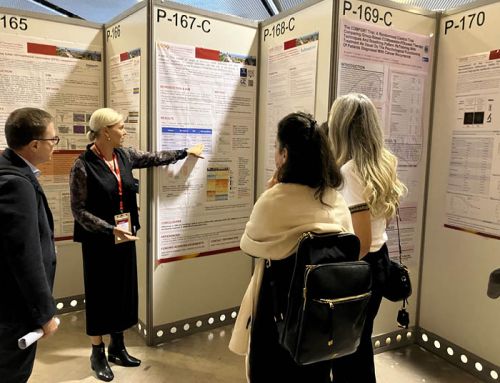Explore a curated selection of publications and presentations from the American Society of Clinical Oncology (ASCO) meeting held in June, 2023.
These insights, chosen by Assoc Prof Yoland Antill, Deputy Chair of ANZGOG’s RAC have the potential to change clinical practice in gynaecological oncology. Stay informed on cutting-edge developments in the field through this exclusive compilation.
Contributed by:
Assoc Prof Yoland Antill
Medical Oncologist
Deputy Chair of ANZGOG’s Research Advisory Committee
ENDOMETRIAL
Patient-reported outcomes from the phase III ENGOT-EN6/RUBY trial of dostarlimab plus standard-of-care CT in primary advanced or recurrent endometrial cancer (abstract 5504). In the dMMR/MSI-H population, patients receiving dostarlimab reported statistically significant improvement in QoL, physical function, role function, fatigue, and back and pelvis pain from baseline through cycle 7 (once the chemotherapy part of treatment was complete) compared with those receiving placebo. No QoL differences between treatment arms reported in overall population from baseline through first year of treatment (cycle 13). Dostarlimab is accessible via an access program for patients with dMMR endometrial cancers- these results are clearly reflective of welcome outcome improvements.
CERVICAL
An international randomised phase III trial comparing radical hysterectomy and pelvic node dissection (RH) vs simple hysterectomy and pelvic node dissection (SH) in patients with low-risk early-stage cervical cancer (LRESCC): A Gynecologic Cancer Intergroup study led by the Canadian Cancer Trials Group (CCTG CX.5-SHAPE).: (abstract LBA5511).
Among women with early-stage low-risk cervical cancer, simple hysterectomy was noninferior to radical hysterectomy as assessed by 3-yr pelvic recurrence rate (2.52% vs 2.17%) and was associated with fewer urologic surgical complications, better QoL, and better sexual health measures. Investigators concluded that following an adequate and rigorous preoperative assessment, simple hysterectomy can now be considered the new standard of care for patients with low-risk early-stage cervical cancer.
Final OS results from KEYNOTE-826: phase III study of CT with or without pembrolizumab as first-line treatment for patients with persistent, recurrent, or metastatic cervical cancer (abstract 5500); At a median follow-up of 39.1 mo, the addition of pembrolizumab to chemotherapy ± bevacizumab continued to demonstrate clinically significant improvements in OS and PFS in women with persistent, recurrent, or metastatic cervical cancer with a CPS ≥1. Pembrolizumab is now available for use with chemotherapy for patients in Australia, a welcome step forward.
OVARIAN
DUO-O: randomized, placebo-controlled phase III study of durvalumab plus carboplatin, paclitaxel, and bevacizumab, followed by maintenance bevacizumab, durvalumab, and olaparib in patients with newly diagnosed advanced ovarian cancer and no BRCA1/2 gene alteration (abstract LBA5506); Trial met its primary endpoints, with PFS significantly prolonged by addition of Durva + Ola to maintenance Bev following first-line PC + Bev + Durva compared with PC + Bev and maintenance Bev in patients with non-tBRCAm advanced ovarian cancer with a HR of 0.49 (95% CI: 0.34-0.69; P <.0001) in the Non-tBRCAm HRD+, HR: 0.68; 95% CI: 0.54-0.86)in the HRP (or HRD-) and HR of 0.63 (95% CI: 0.52-0.76; P <.0001) in the ITT. Importantly this trial did not include a study arm of PC + Bev + Olaparib- currently considered the standard therapy for HRD+ tumours making it difficult to interpret how this study might impact future treatment plans.
MIRASOL:Initial report from a phase III study of mirvetuximab soravtansine vs investigator’s choice of CT in platinum-resistant ovarian cancer with high expression of FRα (abstract LBA5507); investigators concluded that with an improvement in both median PFS (5.62 mo vs 3.98 mo P <.0001) and median OS (16.46 mo vs 12.75 mo P <.0046) together with a tolerable and acceptable safety profile, that this agent could be considered as a new standard of care for patients with FRα-positive PROC. Disappointingly this is not yet available for patients in Australia or NZ with expression for folate receptors also not a routine assessment for treatment decisions.
Enjoy more publications, published by ANZGOG members:











